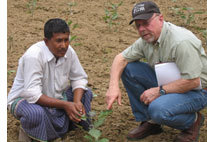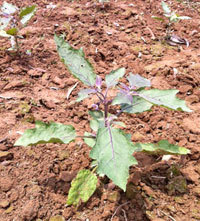Reposted from btbrinjal.tumblr.com (9 April 2014)
In Bangladesh with Bt brinjal farmers
by Tony Shelton, Cornell University professor of entomology and a world expert on Bt plants
9 April 2014 – While visiting Bangladesh to conduct environmental safety assessments for Bt brinjal and help farmers develop resistant management programs to ensure the long-term durability of Bt eggplant, I visited Haidul Islam’s Bt brinjal fields on April 9. Mr. Islam was the same farmer whose crop the Financial Express on April 7 alleged was ridden with insects that Mr. Islam was spraying with insecticides.
 I found the exact opposite to be true. Mr. Islam and his associate proudly showed me his field of Bt brinjal. It was free of pest damage, and they were very pleased with the crop. Normally, they would have already sprayed insecticides on the plants to control the brinjal fruit and shoot borer, but did not have to since the plants resisted their attack. They were pleased to see no borer injury — as were the rest of us who were there inspecting the crop.
I found the exact opposite to be true. Mr. Islam and his associate proudly showed me his field of Bt brinjal. It was free of pest damage, and they were very pleased with the crop. Normally, they would have already sprayed insecticides on the plants to control the brinjal fruit and shoot borer, but did not have to since the plants resisted their attack. They were pleased to see no borer injury — as were the rest of us who were there inspecting the crop.
Bt brinjal resists the brinjal fruit and shoot borer — by far the most destructive pest of brinjal. Females lay their eggs on young vegetative shoots, and the emerging larvae bore into the plant and kill the shoots. Larvae from eggs laid on the fruit also bore into the fruit, making it unmarketable. Neither conventional nor organic sprays provide good control because the young caterpillars burrow into the plant as soon as they hatch. To build up sufficient residues for the larvae to be exposed to the insecticide, all the eggplant tissue must be soaked with insecticide.
Because of the usual intense use of insecticide sprays to control fruit and shoot borers, some consumers refer to harvested eggplants from South Asia as “pesticide bombs.” Bt brinjal is a far safer and healthier way for farmers to control the pest and market their fruit.
 Bt brinjal also allows farmers to use “integrated pest management,” or IPM, to control minor brinjal pests like aphids, thrips, leafhoppers, and whiteflies. Some of these pests can be controlled by other insects — biological control agents like ladybird beetles and lacewings. These beneficial insects are harmed by conventional and organic insecticide sprays. In using resistant plants instead of pesticides to control the borers, farmers allow beneficial insect populations to flourish.
Bt brinjal also allows farmers to use “integrated pest management,” or IPM, to control minor brinjal pests like aphids, thrips, leafhoppers, and whiteflies. Some of these pests can be controlled by other insects — biological control agents like ladybird beetles and lacewings. These beneficial insects are harmed by conventional and organic insecticide sprays. In using resistant plants instead of pesticides to control the borers, farmers allow beneficial insect populations to flourish.
Coupling insect-resistant plants with integrated pest management is a long-term sustainable strategy that is better for the environment, better for farmers, and better for consumer health.
